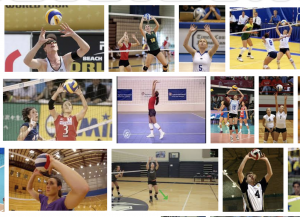Many terms in athletic coaching are poorly defined yet form the basis of disagreements. For example, the word athletic is really not quantifiable, and describes some quality that cannot be calibrated, yet is used as a basis of comparing people. In volleyball, the idea of ball control is heavily valued, is generally thought be observable, but different people will have different specific ideas as to what constitutes having ball control, or how to measure it.
Homographic (despite the potentially juvenile interpretation) refer to situations where the same word can carry multiple meanings, and thus be confused between concepts, often leading to disagreements because each party was actually thinking of a different meaning for that word. For example, the word fly can be used both as a noun and a verb, each one carrying radically different meanings.
But a more subtle disagreement comes with blocking. Blocking refers to both a technique and a strategy. For stat collection purposes, in beach volleyball, a block is only recorded when a player earns a point by jumping up and intercepting a ball at the net. Consequently, this technique is confused with the whole strategy of blocking, which is a component of defense that limits the offensive options of the opposing team. Blocking actions that serve to guide the ball out or into the convertible control of the team are just as valuable as a stuff block. The technique of blocking is thus simply one of the options of the strategy of blocking. Good blockers consider all the available tools for the strategy. A jumping blocker that knocks the ball out of the defensive arena simply introduces unnecessary unpredictability. An effective blocker may never jump at all, and still control the attack options of the other team, and the contribute to the point conversion opportunities.

Another term with homographic confusion between a technique and a strategy is setting – the popular image of volleyball setting (at least as unscientifically assayed through Google Images) is the distinct technique hand setting. Operationally, though, setting is a strategy of establishing the offensive opportunities for the team, and, as with blocking, the technique of hand setting is merely one of the many factors that figure into the strategy of good setting. One who can execute the technique of a hand setting well is not necessarily a good strategic setter. Conversely, good strategic setting should have a broad range of control techniques to carry options for efficient point scoring. Unfortunately, much of the dialog conflates the two meanings of setting, leading to this notion that one can judge the strategic value of a setter simply by evaluating the execution of the technique.


Leave a Reply